Maintaining a healthy weight is crucial for overall well-being and quality of life. Whether you are looking to lose weight, gain weight, or simply understand the importance of calorie intake, this blog post has got you covered. Here, we will explore various methods for maintaining a healthy weight, providing tips for quick weight loss, and discuss the effectiveness of weight loss powders and drinks. Additionally, we will also provide a 7-day guide for losing weight as well as various strategies for a healthy weight gain. So let’s dive in the concepts of weight management!
Healthy Weight: Every lifestyle
Maintaining a healthy weight is very crucial for your health, mind and overall well-being. Whether you have a sedentary lifestyle or an active one, having a healthy weight can offer numerous benefits for your physical as well as mental health.
Here are some tips for maintaining a healthy weight based on different lifestyles:
Sedentary Lifestyle
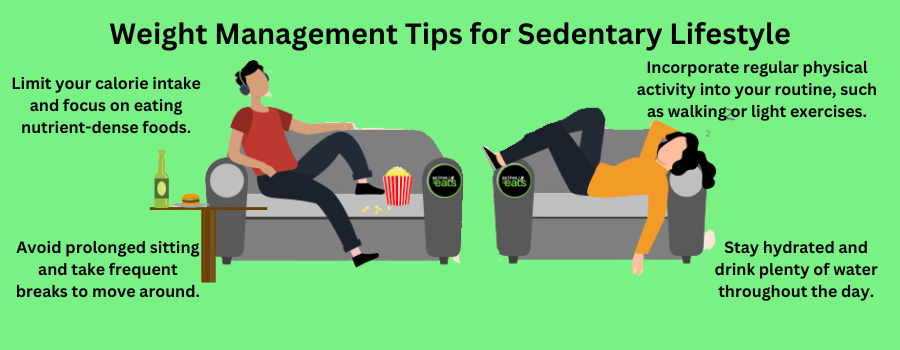
Active Lifestyle
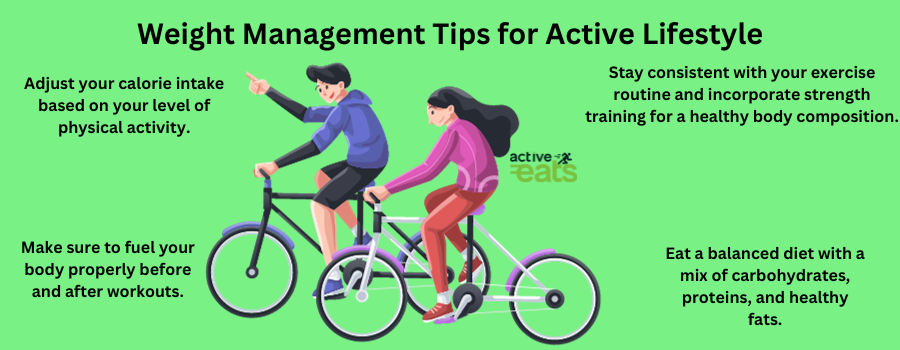
Busy Lifestyle
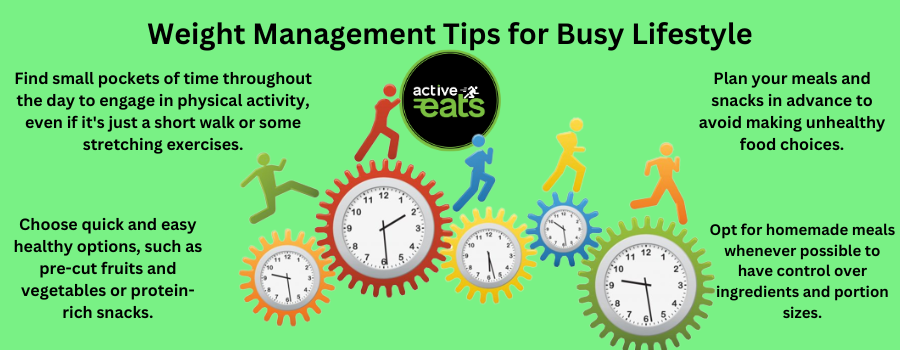
Remember, maintaining a healthy weight is not about strict diets or deprivation, but rather about making sustainable lifestyle changes. Find what works best for you and incorporate healthy habits into your daily routine.
Over Weight: Understanding the Problem
Being overweight simply means having excessive fat cells in the body that can have a significant impact on both your health and quality of life. It is important to understand the problem and take steps to address and manage overweight issues.
Carrying excess weight can put strain on your joints which can result in chronic joint pain. Over-weight people have a higher risk of chronic diseases such as heart disease and thyroid.
Excessive weight gain is also a result of thicker and higher number of fat cells which accumulate around vital organs which may limit their functions. Excessive fat cells may restrict the full ascent and descent of diaphragm as well as hinders the flexibility of chest cavity which narrows the airways to the lungs.
Being overweight also decreases the confidence and hence overweight people also suffer from low self esteem which can lead to depression and low quality of life.
Steps to Take in Order to Address and Manage Overweight Issues
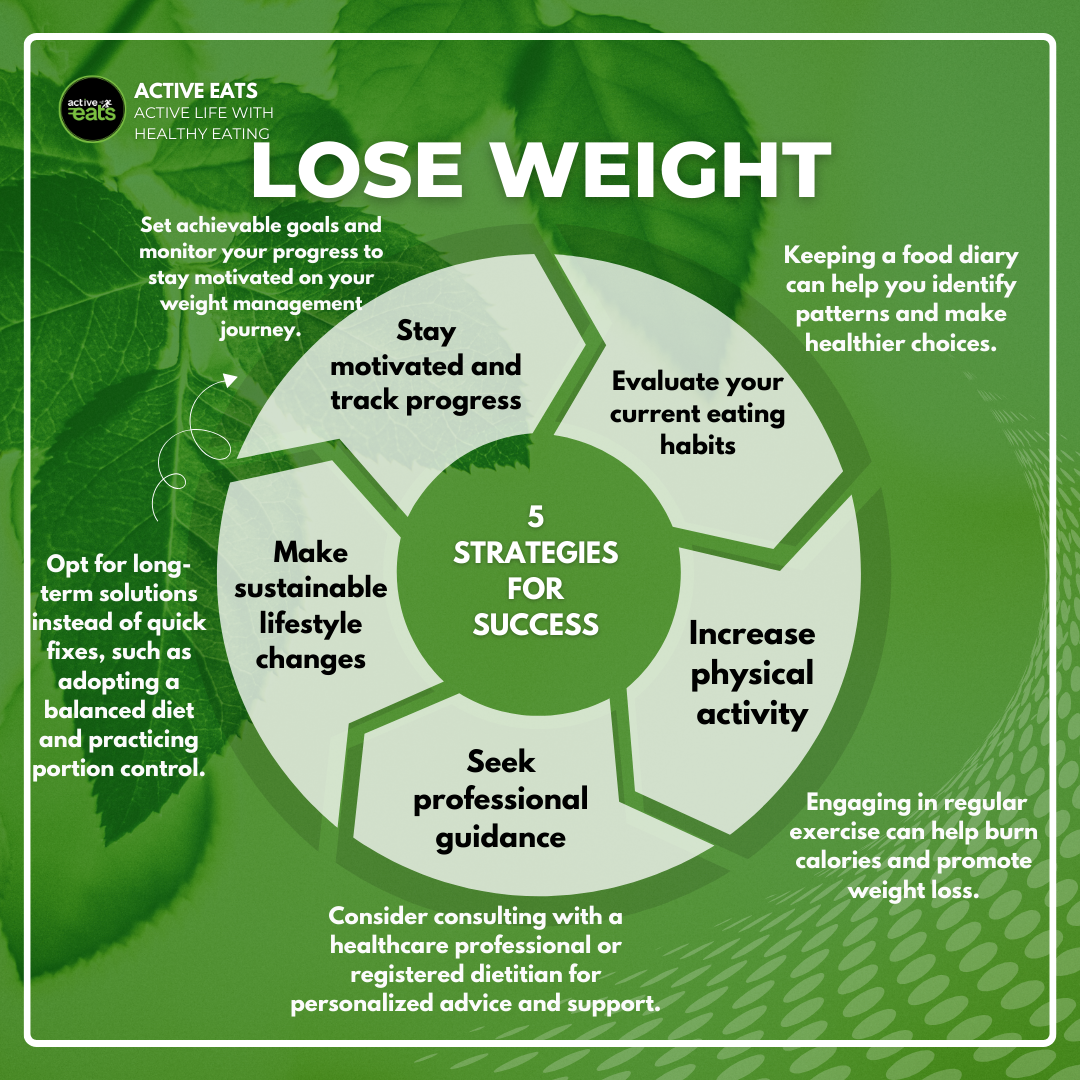
By understanding the problem of being overweight and taking appropriate steps to address it, you can improve your overall health and well-being.
Under Weight: 7 Challenges
Being underweight means having weight which is below what is considered as normal. It can present certain challenges that individuals may face. These challenges include:
Limited energy and strength: Underweight individuals may feel lack of energy throughout the day and low strength even to perform daily activities.
Increased susceptibility to illness: Being underweight weakens the immune system resulting in individuals more prone to illnesses and diseases.
Difficulty in building muscle: Underweight individuals often feels difficult to gain muscle mass due to a lack of sufficient calories and nutrients.
Decreased bone density: Underweight individuals may have lower bone density and hence, an increased risk of fractures and osteoporosis.
Impaired reproductive function: Being underweight can affect hormonal balance and reproductive health.
Poor self-esteem and body image issues: Underweight individuals often struggle with body image concerns and lack self confidence.
Increased risk of nutrient deficiencies: Underweight individuals, generally, tends to eat less food compared to their healthy counterpart. Not consuming enough food and nutrients can lead to deficiencies, affecting overall health.
Fortunately, there are healthy ways to overcome these challenges and gain healthy weight. With proper guidance and support, individuals can adopt strategies to improve their weight and overall well-being but first we need to understand the concept of calories.
Understanding Calories and Daily Calorie Intake
Calories are the basic unit of energy found in food and beverages. It is also the energy produced, store and utilised by an individual. Our body need calories daily to perform its day-to-day task along with performing functions of vital organs like heart, brain, lungs and liver. The food we eat and beverages we consume provide us with the calories needed by our body.
Some food items like oil, butter, honey etc contains high calorie content and most of the fruits and vegetables contain comparatively less calories. The amount of calories in the food and beverages we eat is called as calorie-intake.
If the calorie intake is more than that required by the body then these calories are stored as fat cells and they act as reserved energy storage which are utilised when body does not get the daily minimum required calories.
When it comes to weight management, understanding calories and your daily calorie intake is crucial. Calories play a key role in weight management because they determine whether you gain, lose, or maintain your weight.
Consuming more calories than your body needs will lead to weight gain, while consuming fewer calories than your body requires will result in weight loss.
To maintain your current weight, you need to consume the same number of calories that you burn on a daily basis. By understanding can calculating the amount of calories your body needs, you can effectively manage your weight and make necessary adjustments to achieve your desired goals.
Guidelines for Determining Daily Calorie Intake
Determining your daily calorie intake depends on various factors such as age, gender, weight, height, and activity level. There are many online calorie calculator tools that may help you estimate the number of calories you should consume each day.
However, it’s important to note that the recommended daily calorie intake varies for each individual. Generally, a healthy weight loss is achieved by reducing daily calorie intake by 500-1000 calories from the daily needed calories. This can result in a gradual weight loss of 1-2 pounds per week.
Additionally, a healthy weight gain or bulking can be achieved by increasing daily calorie intake by 1000-1500 calories in the daily needed calories by the body according to the lifestyle. However, calories from healthy food sources should be preferred for a healthy weight gain.
BMI Index and its Importance in Weight Management
The Body Mass Index (BMI) is a measurement table that helps identify an individual’s fitness level of an individual. It is a numerical value obtained from the height and weight of a person.
BMI Index is useful in estimating the fat percentage of an individual along with identifying whether a person is underweight, of a healthy weight, overweight, or obese.
Maintaining a healthy BMI is crucial for overall health as it may help in early detection of fat or obese levels which may lead to chronic diseases such as heart disease, diabetes, and certain types of cancer.
How BMI is Calculated
BMI is calculated using the formula: weight in kilograms divided by height in meters squared (kg/m²). The result is then classified into different categories based on the following ranges:
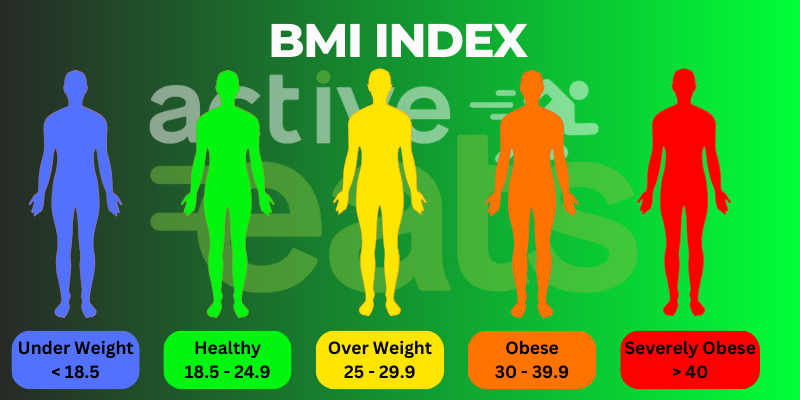
It is important to note that while BMI provides a general indication of weight status, it does not take into account factors such as muscle mass, bone density, and body composition. Therefore, it is always advisable to consult with a healthcare professional for a comprehensive assessment of one’s weight and health.
Methods to Maintain a Healthy Weight
Maintaining a healthy weight is very crucial for overall fitness and healthy lifestyle. When it comes to maintaining a healthy weight, there are several methods that can be effective. By incorporating these methods into your daily routine, you can achieve and sustain a healthy weight for the long term.
Lifestyle Changes
One of the best methods for maintaining a healthy weight is by making sustainable lifestyle changes. It includes small changes in behaviour, food choices, daily habits and patterns. It includes adopting a balanced and nutritious diet, engaging in regular physical activity, managing stress levels, getting enough sleep, and avoiding unhealthy habits such as smoking or excessive alcohol consumption.
Such lifestyle changes may help individuals to gain healthy weight (if you are looking for weight gain) and lose weight and fat in a healthy manner (if you are looking for fat loss).
Portion Control
Controlling portion sizes is the primary step for weight management. Be mindful of the amount of food you consume and practice portion control. Use smaller plates and bowls to help control portion sizes and avoid overeating. Also, it is highly discouraged watching television or Youtube while eating. Mindful eating helps in better digestion, stress reduction and better satisfaction with the food.
It helps in reducing the excess calorie intake and overeating.
Regular Exercises
Regular exercise plays a key role in weight management. Engaging in moderate-intensity exercises such as brisk walking, jogging, swimming, or cycling for at least 150 minutes per week can help you stay fit and healthy. Also, strength training and core exercise may help in building muscle mass and assists in burning calories and increasing metabolism. Find activities that you enjoy and make exercise a part of your daily routine.
Healthy Eating Habits
Avoid crash diets or shortcuts to lose or gain weight quickly and focus on adopting healthy eating habits. Include a variety of fruits, vegetables, whole grains, lean proteins, and healthy fats in your diet. Limit your intake of processed foods, sugary snacks, and beverages high in calories. Try to eat balanced meals and practice mindful eating.
Regular Monitoring
Keep track of your weight and monitor your progress regularly. Track the amount of exercise or workout you are able do. For example, tracking the amount of push-ups can help compare your upper body muscle endurance.
This can help you stay motivated and make necessary adjustments to your diet and exercise routine. Consider weighing yourself once a week and keep a food and exercise journal to track your habits.
Support System
Building a support system can greatly enhance your efforts to maintain a healthy weight. Surround yourself with supportive friends and family members who understand and encourage your goals. Consider joining a weight management group or seeking professional guidance if needed.
By implementing these methods to maintain a healthy weight, you can improve your overall well-being and reduce the risk of various health issues associated with weight gain or loss.
Quickest Ways to Lose Weight
In order to lose weight in an effective and quick manner, you just need to make a diet plan with timeline of physical activities, sleeping hours and exercises that you need to do daily. Consider including the following steps in your weight loss plan:
- Increase physical activity
Incorporate regular physical activity into your daily routine. This can be through exercises such as running, swimming, or cycling.
Also, don’t forget to add gym hours for strength training for adding muscle mass and burning progressive calories.
- Follow a balanced diet
Eat a well-balanced diet that includes plenty of fruits, vegetables, whole grains, and lean proteins. Avoid processed and high-calorie foods.
- Stay hydrated
Drink plenty of water throughout the day to keep your body hydrated and support your weight loss efforts.
- Avoid sugary beverages
Avoid sugary drinks, such as soda and juice, as they are often high in calories and can hinder your weight loss progress.
- Get enough sleep
Sleep plays one third role in weight management. Make sure to get an adequate amount of sleep each night. Lack of sleep can affect your metabolism and make weight loss more challenging.
- Manage stress levels
Find healthy ways to manage stress, as it can lead to emotional eating and weight gain. Practice relaxation techniques or engage in activities that you enjoy.
Remember, the key to successful weight loss is adopting sustainable habits and making long-term lifestyle changes. It is important to prioritize your health and well-being throughout the process.
Sample Diet Plan for Weight Loss
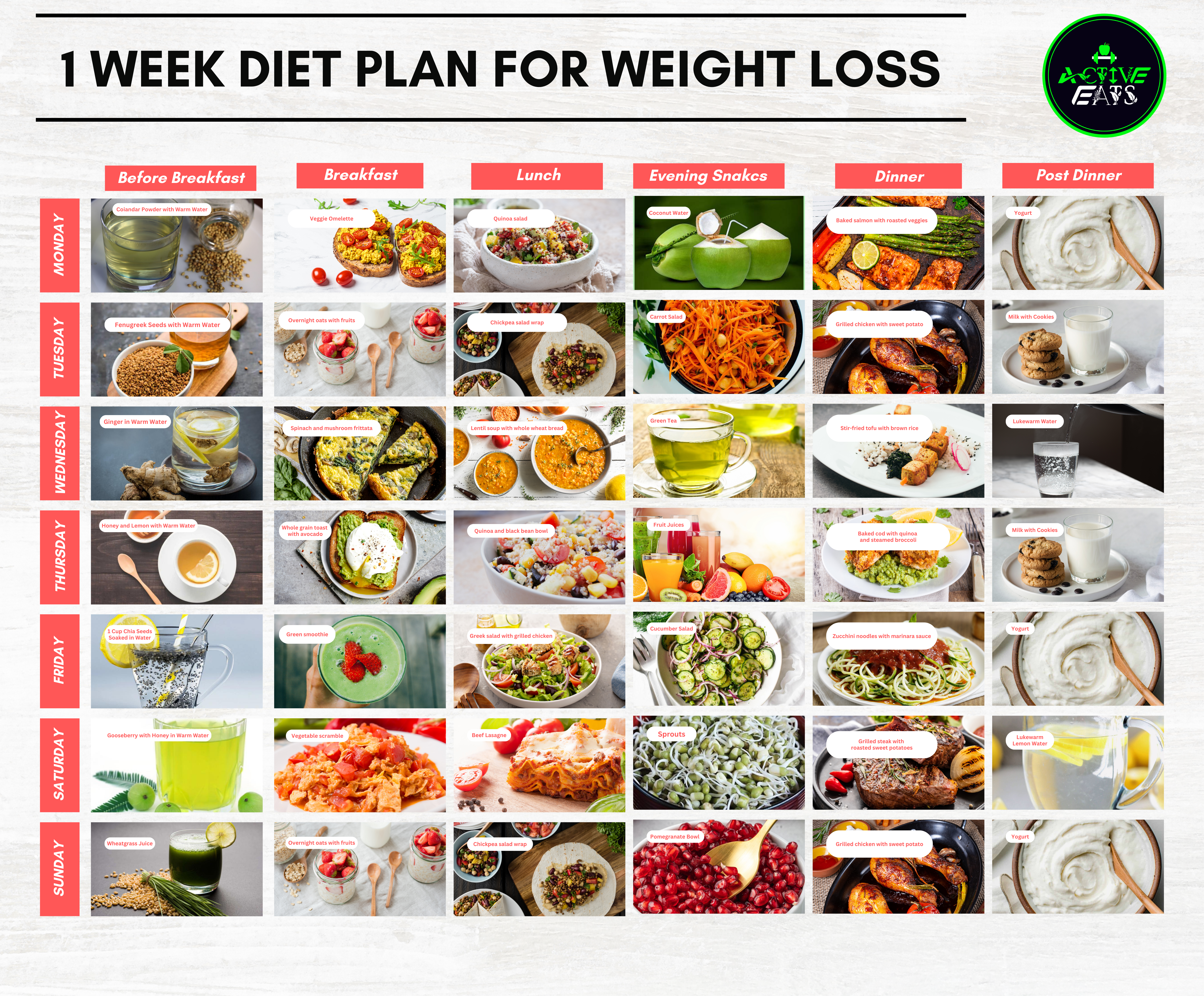
This chart is purely for reference purpose. Every individual’s weight loss journey is little bit different according to their body.
Weight Loss Powder and Drinks
When it comes to weight loss, many people look for quick methods due to which weight loss powders and drinks have become increasingly popular in recent years. These products claim to aid in weight loss by suppressing appetite, increasing metabolism, and promoting fat burning.
However, it’s important to approach these products with caution and consider all the factors and review for their effectiveness and safety.
Some weight loss powders and drinks may provide temporary results due to their diuretic effect, which can result in water weight loss. However, it’s important to note that this weight loss is usually not sustainable and can be regained once the individual resumes their regular eating habits.
Some weight loss powders creates a sense of fullness in the stomach which suppresses appetite which leads to eating less food and hence low calorie consumption. Although it should be noted that using such weight loss powders can only be effect if you follow low calorie diet.
Some weight loss powders are said to increase sweating. This is due to the increased body metabolic rate which results in burning of fat cells and decrease in body weight.
It would be wise to go with a reputable brand and check the ingredient list and avoid products with potentially harmful ingredients.
Remember that weight loss powders and drinks should not be relied upon as the sole method for weight loss. They should be used in conjunction with a healthy diet and regular exercise.
Overall, weight loss powders and drinks can be a convenient addition to a weight loss plan, but it’s important to approach them with caution and make informed choices.
7 Days Plan to Lose Weight
Day 1: Clean Eating
Start your weight loss journey by focusing on clean eating. Fill your plate with nutritious fruits, vegetables, whole grains, and lean proteins. Avoid processed foods and sugary beverages.
Day 2: Hydration
Stay hydrated throughout the day by drinking plenty of water. It helps suppress appetite, boosts metabolism, and keeps you energized.
Day 3: Portion Control
Pay attention to your portion sizes. Use smaller plates and bowls to control your portion sizes. This way, you can still enjoy your favorite foods without overeating.
Day 4: Regular Exercise
Incorporate regular exercise into your routine. Aim for at least 30 minutes of moderate-intensity exercise like brisk walking, jogging, or cycling.
Day 5: Mindful Eating
Practice mindful eating by eating slowly, savoring each bite, and paying attention to your body’s hunger and fullness cues. This can help prevent overeating.
Day 6: Balanced Meals
Create balanced meals by including a source of protein, complex carbohydrates, and healthy fats in each meal. This provides essential nutrients and keeps you satisfied.
Day 7: Rest and Recovery
Giving your body enough rest and recovery is crucial for weight loss. Get enough sleep and prioritize self-care activities to reduce stress levels.
These 7 days activities are meant to understand the important factors and lifestyle changes that needs to be adapted for effective and healthy weight loss.
Effective Methods to Gain Weight
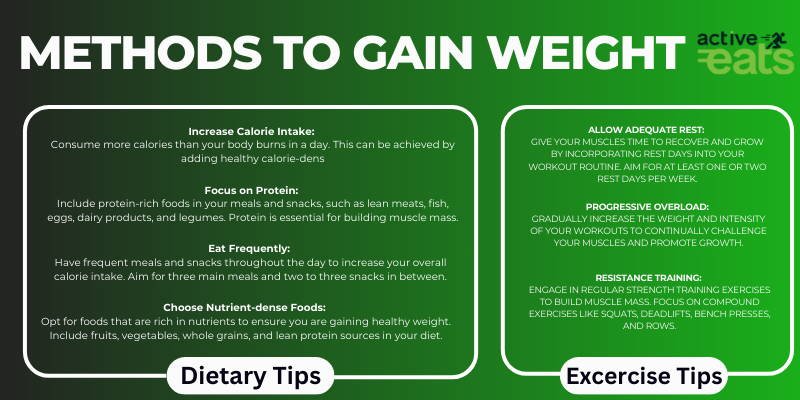
Conclusion
In conclusion, maintaining a healthy weight is essential for overall well-being. It not only improves our physical health but also positively impacts our quality of life. Whether we are overweight or underweight, it is important to understand the challenges associated with our weight and take proactive measures to address them.
Understanding the role of calories and daily calorie intake is crucial in managing weight effectively. By keeping track of our calorie intake and making healthy dietary choices, we can work towards achieving our desired weight goals.
The BMI index is a useful tool in weight management as it helps us determine our ideal weight range for a healthy lifestyle. It is important to maintain a healthy BMI for overall health and well-being.
There are various methods to maintain a healthy weight, including incorporating lifestyle changes and adopting healthy habits. By making sustainable changes to our diet and engaging in regular physical activity, we can successfully manage our weight and improve our overall health.
For those looking to lose weight, it is important to consider safe and effective methods. Rapid weight loss is possible, but it is important to approach it with caution and to consult with a healthcare professional. The use of weight loss powders and drinks should also be done with careful consideration and following recommended guidelines.
Similarly, for those looking to gain weight, it is important to do so in a healthy way. Incorporating calorie-dense foods and engaging in muscle-building exercises can aid in healthy weight gain.
Ultimately, maintaining a healthy weight is a lifelong journey that requires dedication and commitment. By understanding our individual needs and making informed choices, we can achieve and sustain a healthy weight for optimum well-being.


Most Beneficial and Healthy Herbs and Spices - coachactiveeats.com
[…] weight-loss promoting herbs & spices in your meals can add flavor without adding excessive calories or […]
Balanced Nutrition for Special Age Groups - coachactiveeats.com
[…] tends to slow down with age, making weight management a concern for many older men. Be mindful of portion sizes and choose nutrient-dense foods to […]